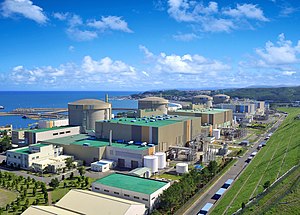Wolseong Nuclear Power Plant
| Wolseong Nuclear Power Plant | |
|---|---|
 | |
 | |
| Official name | 월성원자력발전소 |
| Country | South Korea |
| Location | Gyeongju, North Gyeongsang |
| Coordinates | 35°42′40″N 129°28′30″E / 35.7111°N 129.475°E |
| Status | Operational |
| Construction began | 1976 |
| Commission date | 1982 |
| Nuclear power station | |
| Reactor type | PHWR OPR-1000 |
| Reactor supplier | CANDU |
| Power generation | |
| Units operational | 1 × 678 MW (Wolseong I) 3 × 700 MW (Wolseong II–IV) 1 × 997 MW (Shin-Wolsong 1) 1 × 960 MW (Shin-Wolsong 2) |
| Nameplate capacity | 4735 MW |
| External links | |
| Commons | Related media on Commons |
The Wolseong Nuclear Power Plant, or Wolsong,[1] is a nuclear power plant located on the coast near Nae-ri, Yangnm-myeon, Gyeongju, North Gyeongsang province, South Korea. It is the only South Korean nuclear power plant operating CANDU-type PHWR (Pressurized Heavy Water Reactors).[2] Korea Hydro & Nuclear Power owns the plant.[3] These reactors are capable of consuming multiple types of fuel, including wastes from South Koreas other nuclear plants.
The power plant site including Yangnam-myeon. Yangbuk-myeon and Gampo-eup was designated an industrial infrastructure development zone in 1976. Construction of Wolseong 1 started in 1976 and was completed in 1982. In the following year, the power plant began commercial operations. This PHWR reactor has a gross generation capacity of 678 MW. Wolseong reactors 2, 3 and 4 were completed in 1997, 1998 and 1999, respectively. Each of these reactors has a capacity of 700 MW. Wolseong Nuclear Plant has since operated successfully.[2]
Wolseong Nuclear Power Plant supplies about 5% of South Korea's electricity.[4]
Shin-Wolsong Nuclear Power Plant
Shin-Wolsong No. 1 and No. 2, are two new OPR-1000 type pressurized water reactors. Shin-Wolsong 1 became fully operational in July 2012.[1][5][6]
In June 2013 Shin-Wolsong 1 was shutdown, and Shin-Wolsong 2 ordered to remain offline, until safety-related control cabling with forged safety certificates is replaced.[7] Shin Wolsong-1 was approved for restart in January 2014.[8] In November 2014, Shin Wolsong-2 loaded its first core of nuclear fuel,[8] and the plant was connected to the grid in February 2015,[9] with commercial operation commencing in July 2015.[10]
| Unit | Type | Net Capacity (MW) |
Construction start |
Operation start |
Notes |
|---|---|---|---|---|---|
| Phase I | |||||
| Wolsong-1 | CANDU-6 | 657 | 30 Oct 1977 | 22 April 1983 | [11] |
| Wolsong-2 | CANDU-6 | 673 | 22 June 1992 | 1 July 1997 | [12] |
| Wolsong-3 | CANDU-6 | 686 | 17 March 1994 | 1 July 1998 | [13] |
| Wolsong-4 | CANDU-6 | 694 | 22 July 1994 | 1 Oct 1999 | [14] |
| Phase II | |||||
| Shin-Wolsong-1 | OPR-1000 | 997 | 20 Nov 2007 | 31 July 2012 | [15] |
| Shin-Wolsong-2 | OPR-1000 | 960 | 23 Sept 2008 | 24 July 2015 | [16] |
See also
References
- ^ a b "Korea, Republic of". Power Reactor Information System (PRIS). International Atomic Energy Agency (IAEA). Retrieved 7 June 2013.
- ^ a b (in Korean) 경주시의 산업·교통 (Industry and Transportation of Gyeongju) Nate / Encyclopedia of Korean Culture
- ^ (Sep 10, 2007) ATS wins South Korea nuclear deal TheStar.com / Canadian Press
- ^ "KHNP Fact Sheet". CANDU Owners Group website. Retrieved August 31, 2009. See also site.
- ^ Wolseong Nuclear Power plant Korea Neclear Energy Foundation
- ^ Matthew L. Wald, (January 10, 1991) TALKING DEALS; Help for Canada's Nuclear Industry The New York Times
- ^ "New component issues idle Korean reactors". World Nuclear News. 28 May 2013. Retrieved 7 June 2013.
- ^ a b "Shin Wolsong 2 fuel loading completed". World Nuclear News. 21 November 2014. Retrieved 24 November 2014.
- ^ "Grid connection for South Korean reactor". World Nuclear News. 26 February 2015. Retrieved 3 March 2015.
- ^ "South Korean reactor enters commercial operation". World Nuclear News. 24 July 2015. Retrieved 25 July 2015.
- ^ "Wolsong-1". PRIS. IAEA. 8 June 2013. Retrieved 8 June 2013.
- ^ "Wolsong-2". PRIS. IAEA. 8 June 2013. Retrieved 8 June 2013.
- ^ "Wolsong-3". PRIS. IAEA. 8 June 2013. Retrieved 8 June 2013.
- ^ "Wolsong-4". PRIS. IAEA. 24 July 2015. Retrieved 25 July 2015.
- ^ "Shin-Wolsong-1". PRIS. IAEA. 8 June 2013. Retrieved 8 June 2013.
- ^ "Shin-Wolsong-2". PRIS. IAEA. 25 July 2015. Retrieved 25 July 2015.
